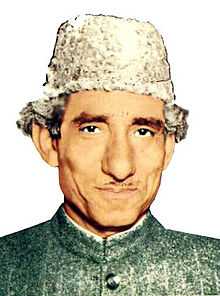Ghulam Mustafa Tabassum
| Sufi Tabassum صوفی تبسم | |
|---|---|
 | |
| Born |
Ghulam Mustafa Tabassum 1 October 1898 Amritsar, British Punjab |
| Died |
1978 (aged 80) Lahore, Pakistan |
| Occupation | Poet |
| Nationality | Pakistani |
| Genre | Fiction |
| Subject | Literature |
Ghulam Mustafa Tabassum (4 August 1899 – 1978) was a noted 20th-century poet in three languages: Urdu, Punjabi, and Persian. Tabassum (or Tabussum) was the pen name by which he was universally known.[1]
He is best known for his many poems written for children, as the creator of the Tot Batot character, and as the translator of many poetical works from Urdu and Persian into Punjabi. Tabassum's style is in the classical tradition, informed by a deep awareness of the pain and suffering that afflicts modern life.[2]
Tabassum was born in Amritsar, Punjab, to parents of Kashmiri ancestry. He earned a Master's degree in Persian from Forman Christian College (FCC) in Lahore. He remained with Government College Lahore for his entire career, rising to head the Department of Persian Studies.[1]
For fifty years he was a prominent speaker on radio and television.[2] His poems were used as the lyrics of several songs sung by Noor Jehan.[3]
In 1966 he received the Tamgha-e-Nishan-e-Sipaas award of the Government of Iran,[1] and he was awarded the Sitara-i-Imtiaz by the Government of Pakistan.
Tabassum's son, Nisar Ahmed, was also a stage play writer and wrote many comedies, mainly Punjabi stage plays and television dramas.
Tabassum was a follower of Nawab ud din Ramdasi of the Chishti Order, according to Mazhar ud din.
Works (partial list)
- Tot Batot Collection. Published by Ferozsons, (no date). ISBN 969-0-01118-9.
- Ab Sab Hain Tot Batot Mian. Published by Gulzar Ahmed, 2000.
- Jholanay. Published by Ferozsons, (no date)
- Dogona. Published by Ferozonsons (a translation of the works of Hazarat Ameer Khosro)
- Suwan Raine Da Sufna, a translation into Punjabi of Shakespeare's A Midsummer Night's Dream, unknown publisher.
References
- ↑ 1.0 1.1 1.2 "Poets". Enyclopedia of Pakistan. Overseas Pakistanis Foundation. December 2006. Archived from the original on 22 September 2008. Retrieved 22 July 2011.
- ↑ 2.0 2.1 Leading Personalities of Pakistan, South Asian Media Net.
- ↑ Hamid, A (26 Nov 2006). "Nur Jehan: One in a Million". Daily Times (in Urdu and English) (APNA (Academy of the Punjab in North America)). Retrieved 24 Dec 2008.
|